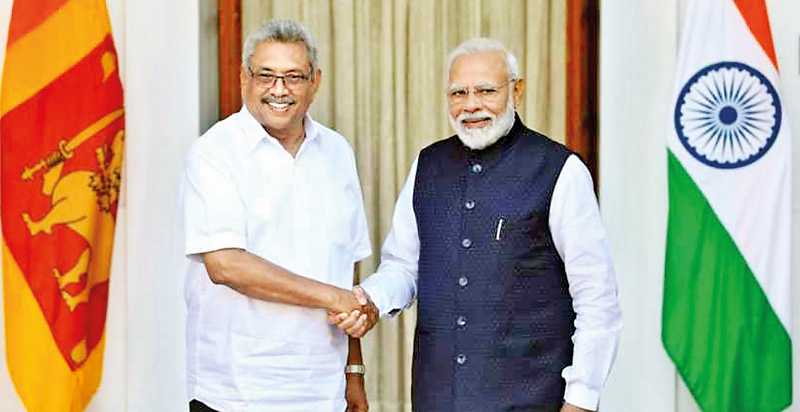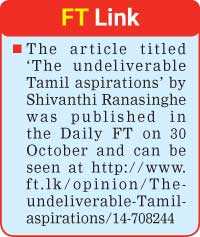Thursday Feb 05, 2026
Thursday Feb 05, 2026
Monday, 2 November 2020 01:25 - - {{hitsCtrl.values.hits}}

India and its Prime Minister Narendra Modi should get with the (Gotabaya) program and operate within the presidential parameters
By Dr. Dayan Jayatilleka
When an individual (in this case Shivanthi Ranasinghe) listed in official releases as ‘Deputy Director – International Relations & Foreign Media’ of the Office of President Gotabaya Rajapaksa, writes a ‘Wolf Warrior’-ish article openly critical of India and its Prime Minister Modi, without a standard disclaimer that it represents only her personal views and not those she holds in her official capacity, it is worthy of notice. (See http://www.ft.lk/opinion/The-undeliverable-Tamil-aspirations/14-708244)
When the article frontally critical of the Indian PM appears against a backdrop of the Rajapaksa administration having cancelled the Japanese project for a Light Rail (while an expert from the University of Moratuwa gives a detailed endorsement of the project), and follows a visit by US Secretary of State Mike Pompeo which does not conclude with the traditional Joint Statement but a President’s Media Division release which indicates ‘cordiality’ but also a degree of Presidential coolness, then all of it is symptomatic of the Presidency boxing itself in or painting itself – and, far worse, Sri Lanka – into a vulnerable corner, in international relations.
While I have no intention of a polemical attempt at refutation, it is my duty as a student of international affairs and foreign policy, to draw the attention of the reader to what a member of the Presidential staff whose official responsibilities and duties are in the domain of ‘International Relations’ has to say about Sri Lanka’s axiomatically most important external relationship, that with India. Of course, it is possible that geospatial reality notwithstanding, the relationship with India is no longer regarded as Sri Lanka’s most important single relationship. 
Ten excerpts from the article follow:
“…Indian Premier Narendra Modi ignored all these glaring facts when he reiterated the long-hackneyed demand for ‘Tamil aspirations’ at the virtual bilateral summit with Premier Mahinda Rajapaksa on 26 September 2020.”
“It is just not possible to devolve power to the Tamils in the north and east.”
“…Thus, for PM Modi to speak of ‘Tamil aspirations’ without addressing this anomaly is questionable.”
“Dr. Jayatilleka…is aghast that a State Minister dared to state the obvious that the Indian Premier was out of line. Yet, as the subject minister, Rear Admiral Sarath Weerasekera was correct to point out that implementing the 13th Amendment or to change the unitary status of the country to a united nation is a decision solely for the people of Sri Lanka. As a subject expert, Minister Weerasekera was also correct to note that the 13th Amendment is not a solution for Sri Lanka.”
“This was a bilateral summit and as such, was between nation to nation. Thus, neither country can address the concerns of only one community…The very implication that arises by doing so is undiplomatic and therefore unacceptable…PM Modi committed quite a faux pas by calling on the Sri Lankan Government to ensure equality, justice, peace and respect to Tamils.”
“…if we are to silently concede to India simply because it is a larger force and a member of an even greater force, what should be our position if the Muslim nations collectively impose on us to deliver on the ‘aspirations’ of the Muslims?”
“…Therefore, it is very clear that unless force is used the 13th Amendment is not feasible. Even then, it will not resolve any real or perceived grievance, but likely create problems of unmanageable proportions.”
“Yet, as observed by Dr. Jayatilleka, “Prime Minister Modi only reiterated what he had said many times before”. The reasons for India’s continued interest in an unattainable objective ought to pique political analysts’ interest…India uses the 13th Amendment to keep Sri Lanka off balance.”
“…In this context, PM Modi was wrong to reiterate his call for the 13th Amendment’s implementation – especially when President Gotabaya Rajapaksa had already articulated his position on the matter.”
“In the past, this has been a bait for the Tamils in the north and east to turn antagonistic to their own Government. This kind of interference on (sic) Sri Lanka’s internal affairs had not only led to the destruction of innocent lives, but had been catastrophic to India as well. Therefore, it behooves India also to move out of ‘traditional politics’ and partner with Sri Lanka towards a peaceful coexistence with all stakeholders.”
The key takeaways are as follows:
Prime Minister Modi transgressed egregiously when he referred to ‘Tamil aspirations’ in his virtual summit with Prime Minister Rajapaksa.
Prime Minister Modi should not have referred to the 13th Amendment because President Gotabaya Rajapaksa has already made his views clear on the matter. The Indian PM should have deferred to the red line drawn by President Gotabaya.
Devolution of power to the Tamils of the north and east is off the table. The 13th Amendment and a political solution for Tamil aspirations based upon that amendment, are off the table. India and its Prime Minister Narendra Modi should get with the (Gotabaya) program and operate within the Presidential parameters.
My point is by no means that all small states should defer to large neighbors. Cuba doesn’t. But Cuba’s ‘soft power’ appeal, deriving from its long-standing occupation of the moral-ethical high-ground, is and has always been such that for over a quarter century now, when it has annually moved a resolution against the US embargo at the UNGA in New York, it registers a winning triple-digit vote including those of US allies, while the USA at last count was down to three votes (with the US itself abstaining a few years ago).
In the US political context, senior US Senator Patrick Leahy, who reminds the Senate as well as public audiences that the Leahy amendment – known as the Leahy Law – imposes strictures on military aid to countries like Sri Lanka, is the same Senator Patrick Leahy who campaigned strongly for opening-up to Cuba and attacks President Trump for reimposing sanctions.
One trusts that President Gotabaya Rajapaksa, his staff and hardcore loyalists can figure out the difference—qualitative, existential and ontological.
Meanwhile, the Melian dialogue in Thucydides’ ‘The History of the Peloponnesian Wars’ should be required reading in the President’s Office—and for selected State Ministers. So should the history of former Yugoslavia under Slobodan Milosevic and Georgia under Mikhail Saakashvili. A world map should be an indispensable part of the interior décor.
I’ve always been a huge fan of Ravana, but that didn’t really go well for us did it? And it couldn’t have, even if a friendly, faraway civilisation had slipped us some large (A2/AD) fireworks.